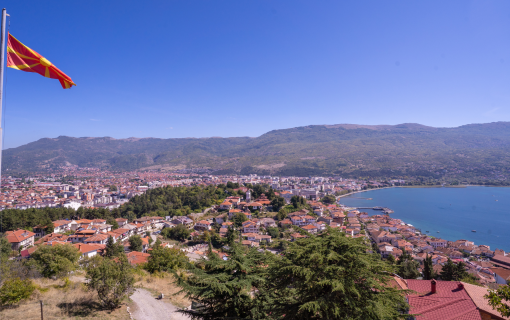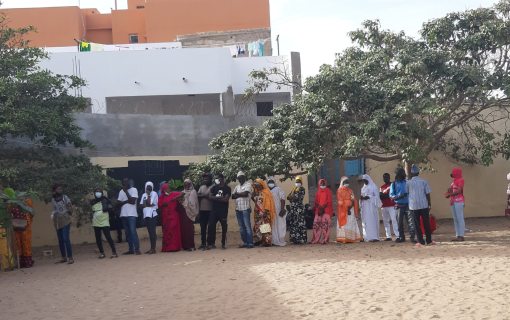IFES Alumni Lisa Kammerud Talks Elections, Conflict and Gender
Elections and Conflict Specialist Lisa Kammerud, currently working as a consultant, discovered election assistance through a research and communications internship at IFES in 2001. The experience sparked her interest in elections, though she was pursuing an MA in conflict prevention and resolution work at the time.
More than a decade later, Kammerud has become an authority on elections and conflict. She has traveled to every region of the world to help make political participation safer. She sat down with us to answer some questions about election violence and gender.
How did you develop a focus on elections and conflict?
I was always looking for a way to use my conflict background at IFES, so from the moment I heard about IFES’ Election Violence Education and Resolution (EVER) program, I hoped to get a chance to work on it. The program incorporated conflict analysis, prevention and mitigation elements in relation to elections.
Eventually, I got the opportunity to work on the initiative and IFES sent me on my first field implementation shortly after. I was hooked – this was important and interesting work, and was built around partnerships with local organizations. From EVER, I began to look at elections and conflict more generally.
You edited and helped with the research and data analysis for the IFES white paper Breaking the Mold: Understanding Gender and Electoral Violence. Please tell us about this intersection.
In our field, when people talk about election violence, they usually refer to examples of physical violence against party supporters, or intimidation and oppression related to different groups of people, like political parties or certain ethnic groups. Although we know intimidation and physical violence can also happen on a small scale, between individuals, we still cite examples that are tangible or easily witnessed and verified.
From the women who are increasingly participating in elections around the world, there are examples of other types of violence. Threats of divorce or domestic violence may pressure a woman to vote as one’s father or husband does. Mother-in-laws may pressure women in the family to vote a certain way. Women candidates have faced particular types of intimidation, harassment and threats or acts of sexual violence that men have not and do not. Gender violence and discrimination in other areas of a society manifest in forms of election violence against women. Further, women can also be perpetrators of election violence. However, there is still a dearth of good data and information about the differences between how men and women experience electoral violence, and that is a key area of focus for IFES and its programs and research in the next year.
What can be done to lessen election-related violence against women? How can women contribute to this endeavor?
While the research IFES is currently undertaking will help provide detailed program guidance, and exact measures will depend on country context, there are some general actions to take now that could help.
As noted in the white paper, increased cross-sector coordination between organizations focused on gender and those conducting electoral assistance could improve training and support to civil society organizations, legal aid offices, security forces and election workers regarding protection and services for women participating in electoral processes. Gender-sensitive assessment frameworks related to electoral processes and conflict risk, as well as a long-term investment in civic education, conflict and gender programs, would also be useful.
Streamlining gender and electoral violence sensitivity within assistance to election management bodies, political parties and security agencies is also an important early step. Public awareness messages promoting women’s right to participate and showing women engaged in electoral processes can also help. Women can and do contribute through their determination to participate, and through taking part in civic education, leadership training and other capacity building efforts. It is also crucial to improve access for women to learn and share information on how and to whom to report incidents of physical or psychological violence.
How else is the electoral process experienced differently by women?
Voting poses different challenges for women, not necessarily related to the risk of electoral violence. Women are generally responsible for children in the family, and can have difficulty finding child care in order to vote. They may also experience difficulties traveling on their own, depending on the norms or laws of the country. Women may also feel less secure traveling in certain areas or in the evening.
All aspects of the electoral process have the potential to be experienced differently – from candidate nomination procedures to the acceptability of door-to-door campaigning, to becoming part of the election management body staff – depending on each country context. Understanding these gender differences and obstacles is a key part of IFES’ programming.
What are your favorite memories of your work in the field with IFES?
One of my early impressions was watching Chinara Kumenova, a young, seemingly quiet woman, manage a lively group of monitors in a training in 2005 in Bishkek. She deftly turned aside off-topic issues for later and honed in on the key points in longer questions. It was an early lesson in keeping a group on task, sensitively but firmly.
A favorite memory is during a residential training in Bangladesh. The monitors and trainers would gather together in the common room, and people played small instruments and sang; it was a relaxing and rewarding way to spend the evening after a long day’s work! It was also a way to connect across the language barrier, and I feel very fortunate that I could share that.
Who are some of the most inspirational persons you have met while doing this work?
Professor Bogoro from Northern Nigeria is a respected academic and the head of an organization working with women and youth. He was also the head of a coalition that worked with IFES on the EVER project. He had many herculean tasks during the electoral cycle, but was always soft-spoken, wise and looked to build consensus among partners.
Adil Rahman Khan is the Secretary of Odhikar, the pre-eminent human rights organization in Bangladesh. He is an attorney by day and a leading advocate for a determined and diligent network of human rights defenders.
I found the monitors we worked with to be the most inspiring, from our first team in Ghana, to the men and women I met in my last project in Senegal. All of the monitors faced tremendous challenges in travel, transport and communication as they covered their areas for reporting, but they continually overcame them.









